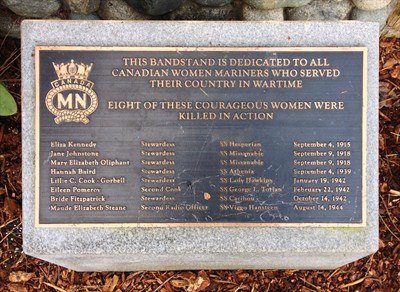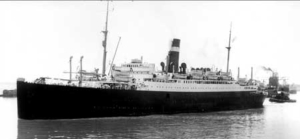Heroic behaviour is not exclusively a male attribute. Women also behave with courage in times of war and peace, although their acts of bravery are not always recognized.
Canadian nurses volunteered their services during a period of great change and innovation in the field of military medical services. It was also a time of tremendous danger. Canadian military nurses, or nursing sisters, as they were sometimes called, often worked right near the front in wartime. They were also present on hospital ships, where they daily faced the threat of torpedo attacks.
Many of them lost their lives on the job.
Records show that the first women officially in the Royal Canadian Navy were six RCN nurses in WWI who served during August 1914 on His Majesty’s Canadian Hospital Ship HMCHS Prince George, the only Canadian hospital ship to ever sail with the Royal Canadian Navy (RCN). To find out more about their contribution, see the article about RCN Nurses in WWI in the Paving the Way section of our website.
Just hours after Britain declared war on Germany on September 3, 1939, the unarmed passenger liner Hannah Baird was working aboard, the S.S. Athenia, was torpedoed by a German submarine, U-130. Although she was the first Canadian casualty of the Second World War, Baird’s name is not well known.

A memorial to Canadian women mariners who served their country in wartime is part of the Veterans’ Memorial park in Langford, BC.
Nor are the names of the other seven Canadian women who died while serving in merchant ships during both World Wars.
Maude Elizabeth Steane was one of an adventurous group of women from Canada who trained as radio operators and then went to sea with the Norwegian Merchant Navy, the only Allied merchant fleet that at that time permitted women to serve aboard ships in that role. She lost her life while working as a wireless operator aboard the S.S. Viggo Hansteen. Like Hannah Baird and the other Merchant Marine Women who perished, her name might be forgotten entirely if not for the efforts of a few veterans and researchers.
Mollie Entwistle was awarded the British Empire Medal (Military) for her “conspicuous coolness and courage” in saving her Canadian Women’s Army Corps (CWAC) colleagues from an Ottawa hotel fire in 1942.
CFB Esquimalt Naval and Military Museum honours all these women of courage, and the many whose names will never be recognized.
By Clare Sharpe
Museum staff member/webmaster

